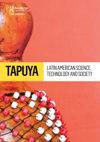The number of disappearance: trajectories in the tally of victims of forced disappearance in Latin America
IF 1.2
Q2 HISTORY & PHILOSOPHY OF SCIENCE
Tapuya: Latin American Science, Technology and Society
Pub Date : 2022-08-30
DOI:10.1080/25729861.2022.2090486
引用次数: 0
Abstract
ABSTRACT The “metric turn” is shaping human rights knowledge, governance and politics globally. This article seeks to contribute to the emergent analysis of numbers in human rights matters from a Latin American perspective. We explore a phenomenon that is hard to count; the number of victims of forced disappearance –persons who are kidnapped and murdered, and whose bodies are disposed of. And we study it in three contexts of political institutional violence on the continent – the dictatorship in Chile (1973–1990), the armed conflict of Colombia (1958–), and México's dirty wars (1964–1998) and narco-conflicts (2002–). Focusing on numbers' liveliness, we draw from interviews, institutional documents and archive analysis to examine the trajectory of the number of forced disappeared persons and how it mobilizes and is shaped by human rights concerns. Transitivity is crucial in the trajectory and liveliness of numbers. Challenging the view that numbers only prove effective when decontextualized, we show that transitivity is a mathematical, cognitive, and political achievement, and identify the effects of transitive but also of referential and provisional numbers in the human rights field. Particularly, how they contribute to the acknowledgement and handling of human rights violations, pushing for the production of accountability regimes.失踪人数:拉丁美洲强迫失踪受害者的统计轨迹
“计量转向”正在全球范围内塑造人权知识、治理和政治。本文旨在从拉丁美洲的角度对人权问题中的数字进行新兴分析。我们探索一种难以计数的现象;强迫失踪的受害者人数-被绑架和谋杀,尸体被处理的人。我们在三种背景下对非洲大陆的政治制度暴力进行了研究——智利的独裁统治(1973-1990),哥伦比亚的武装冲突(1958 -),以及姆萨梅西科的肮脏战争(1964-1998)和毒品冲突(2002 -)。我们从访谈、机构文件和档案分析中汲取数据的活力,审视强迫失踪人数的发展轨迹,以及它如何受到人权问题的影响和影响。及物性在数字的轨迹和活力中起着至关重要的作用。我们挑战了数字只有在去语境化时才有效的观点,表明及物性是一项数学、认知和政治成就,并确定了及物性数字、参考数字和临时数字在人权领域的影响。特别是,它们如何有助于承认和处理侵犯人权的行为,推动问责制的产生。
本文章由计算机程序翻译,如有差异,请以英文原文为准。
求助全文
约1分钟内获得全文
求助全文
来源期刊

Tapuya: Latin American Science, Technology and Society
Social Sciences-Social Sciences (all)
CiteScore
1.60
自引率
0.00%
发文量
39
审稿时长
19 weeks
 求助内容:
求助内容: 应助结果提醒方式:
应助结果提醒方式:


